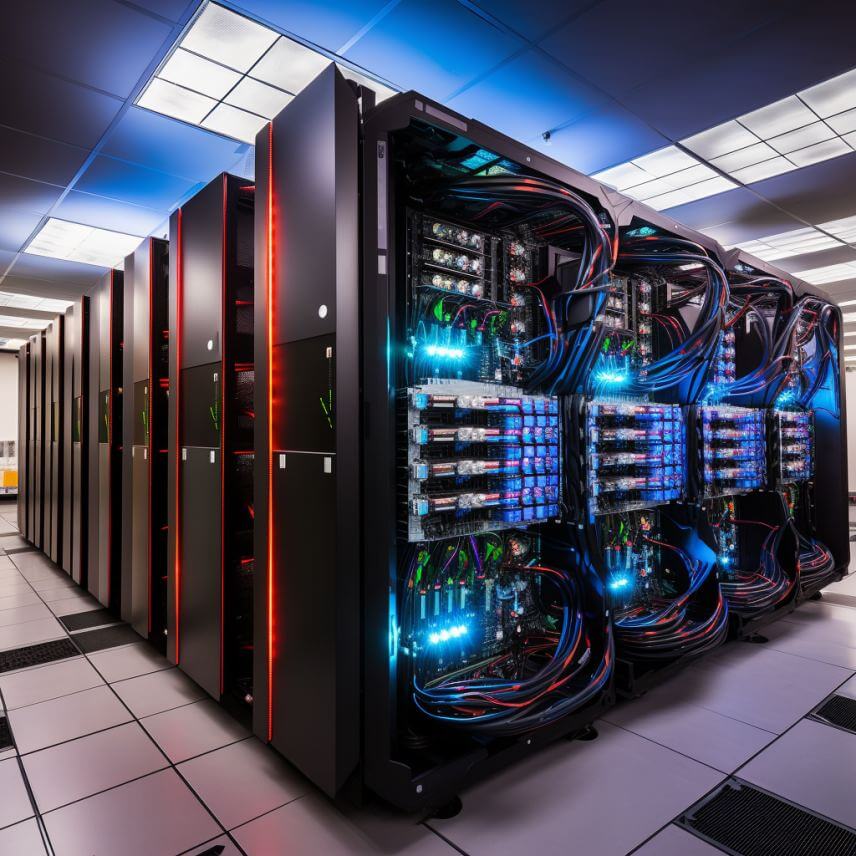In an innovative move, the UK government has pledged a substantial £225 million to fund Isambard-AI, a supercomputer set to redefine the country’s AI computational capabilities. Unveiled at the UK’s AI Safety Summit, Isambard-AI, to be hosted by the University of Bristol and powered by Nvidia, is poised to become one of the world’s top 10 supercomputers, with a double-precision performance exceeding 200 petaFLOPS.
Isambard-AI’s technological marvels
Isambard-AI, the brainchild meticulously crafted by the innovative minds at the Isambard National Research Facility, is primed to create seismic ripples in the expansive realm of global artificial intelligence. With an awe-inspiring computational might reaching an astounding 200 petaFLOPS in double-precision performance, this supercomputer is on the brink of challenging the reigning heavyweight, China’s Tianhe-2A, currently holding the prestigious position as the tenth most powerful supercomputer worldwide.
The nucleus of Isambard-AI’s supremacy lies within its core components—an impressive assembly of 5,448 Nvidia GH200 Grace-Hopper Superchips seamlessly integrating a 72-core Arm Grace CPU and a Hopper GPU, interconnected via a lightning-fast 900GB/s NVLink-C2C.
Unveiled to the world in the year 2022, this technological marvel not only pledges an unparalleled expedition into the realms of computational velocity but also pioneers an ingenious approach to temperature management. Nestled within a self-cooled, self-contained datacenter, Isambard-AI embraces sustainability through a cutting-edge heat-reuse system. This eco-conscious initiative positions the project at the forefront of responsible technological advancement.
As a precursor to its larger counterpart, Isambard-3 is slated to make its debut, offering an exclusive preview to the scientific community in the United Kingdom. This strategic move not only provides a glimpse into the future but also underscores the Isambard-AI project’s commitment to catapulting the nation into the zenith of artificial intelligence and high-performance computing research. The stage is set for the Isambard-AI project to etch an indelible mark on the landscape of technological innovation, propelling the United Kingdom to new heights in the ever-evolving field of AI research.
Paving the way for advanced AI applications
While Isambard-AI’s double-precision high-performance compute (HPC) capabilities are noteworthy, its primary focus extends beyond traditional computing realms. With a strategic emphasis on AI and lower-precision floating-point calculations, the supercomputer aims to extract 21 or more exaFLOPS in applications that prioritize speed over absolute accuracy. This flexible precision approach positions Isambard-AI as a versatile tool for emerging AI and HPC arenas.
Researchers anticipate leveraging the varying floating-point precisions supported by Isambard-AI, ranging from FP64 down to sparse FP8. This flexibility opens avenues for exploring low or mixed-precision workloads, aligning with the evolving demands of both AI and HPC fields. As the Isambard project unfolds, it is poised to contribute significantly to the frontier of computational research.
Isambard-AI’s future impact
As Isambard-AI prepares to take center stage in the global computing arena, one cannot help but wonder about the transformative impact it will have on diverse fields of research. How will this technological leap influence the trajectory of AI applications, from drug discovery to climate modeling? Only time will reveal the true extent of Isambard-AI’s capabilities and its role in shaping the future of computational science. Stay tuned for more insights as we delve deeper into Isambard-AI and other cutting-edge systems at the upcoming Supercomputing 2023 event in Denver, Colorado.





